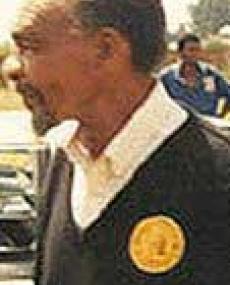
Elijah Barayi was born in Lingelihle, (Cradock ) Eastern Cape, on 15th of June in 1930. He was one of eight children of working class parents. Barayi attended Lwana Primary School and completed his junior certificate at Nuwell High School. He matriculated at Healdtown Institute in 1949.Barayi joined the ANC Youth League in 1952 as a teenager and became an efficient organiser and an able speaker. He was arrested in the early 1950s for his participation in the Defiance campaign.He was the first president of the Congress Of South Africa Trade Unions(COSATU).
Barayi worked briefly for the Department of Native Affairs but resigned as he felt it was in the forefront of administering apartheid. He held a variety of jobs until 1960 when he left the Eastern Cape to take up employment as a clerk at State Mines, Brakpan. At that stage, he was an organising secretary for the ANC and was detained during the 1960 State of Emergency and held for six months.
In May 1973, Barayi moved to Carltonville and in 1976 he became a personnel assistant on the mine. He experienced firsthand the conditions that miners experienced underground.He was elected as the liaison committe. Following the report of the Wiehahn Commission in 1979, Barayi became active in establishing the trade union movement on the mines.In 1981 he became a shaft steward at Blyvooruitzicht for the National Union of Mineworkers(NUM).
In 1982, the National Union of Mineworkers was formed with Barayi as the Vice-President. In May 1985 he led 9000 miners at Blyvooruitzicht on strike in protest against the dismissal of two shaft stewards.In 1986 when the nationwide state of emergency was declared, he was detained for two weeks then restricted to the Caltonville magistrate distric.In 1987 he was back on public platforms.
In December 1985 at the launch of the Congress of South African Trade Unions (COSATU), Barayi was elected president of the new organisation, a position he held until 1991. At the launch, Barayi called for the abolition of the pass laws, giving the government six months to comply with this demand before Cosatu embarked on a pass burning campaign. He also stated, inter alia, that disinvestment would work towards the dismantling of apartheid if it was fully applied and pressure was brought on South Africa by the United States of America and Great Britain.
During the second state of emergency in 1986, Barayi was detained for two weeks and released with orders restricting him to the district of Carltonville, Transvaal. Barayi retired from COSATU in 1991 and 1993 from mine work.He was married to Nontobeko and they have four children.Barayi passed away on 24th of January in 1994 after a short illness.